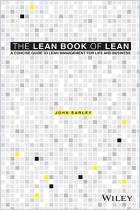Join getAbstract to access the summary!

Join getAbstract to access the summary!
Masaaki Imai
Gemba Kaizen
A Common Sense, Low-Cost Approach to Management
McGraw-Hill, 1997
What's inside?
Continuous, never-ending improvement. All you need to Know about Kaizen.
Recommendation
Author Masaaki Imai argues that companies can become more profitable by constantly looking for efficiencies instead of seeking huge leaps, as is the Western custom. The Japanese philosophy of kaizen says businesses must mercilessly cut waste by eliminating anything that’s even remotely inefficient. These strategies will lead to more profitable companies and better employee morale. Imai makes compelling arguments, and supports them with a number of case studies and real-world examples that show kaizen in action. getAbstract recommends this book to managers, particularly executives of manufacturing companies.
Summary
About the Author
Masaaki Imai is a lecturer and consultant. He chairs the Kaizen Institute of Japan. His first book, Kaizen: The Key to Japan’s Competitive Success, sold more than 179,000 copies and was translated into fourteen languages.



















Comment on this summary